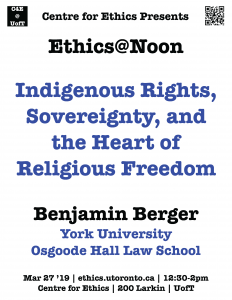
Indigenous Rights, Sovereignty, and the Heart of Religious Freedom
Recent years have seen the rise of religious freedom as the “most difficult right” in the Canadian legal landscape, just as it has become an increasingly contested constitutional concept in other jurisdictions. Freedom of religion has become a site for debate about the nature of the public/private divide, the balancing of competing rights, and the role of group and collective rights. Scholarship seeking to understand the right — and the place and workings of religious freedom within liberal constitutionalism — has tended to explore its relationship to broad concepts like “secularism” and multiculturalism, and to understand it either as an equality- or liberty-based protection. This talk will use the Supreme Court of Canada’s recent decision in Ktunaxa Nation v British Columbia as a pathway into a different understanding of the fundamental problematic at play in religious freedom. In Ktunaxa, an Indigenous nation sought protection of its religious beliefs and practices under section 2(a) of the Charter. Linking the case to other developments in Canada and abroad, this talk will argue that the Ktunaxa Nation’s decision to pursue their claim as a matter of freedom of religion — and the Court’s reasons for unanimously rejecting that claim — call our attention to the place of sovereignty in the architecture of religious freedom. The specific features of Indigenous religions in a colonial context, and their awkward treatment in law, illuminate more broadly what is so difficult about freedom of religion.
☛ please register here
Benjamin Berger
York University
Osgoode Hall Law School
Wed, Mar 27, 2019
12:30 PM - 02:00 PM
Centre for Ethics, University of Toronto
200 Larkin
